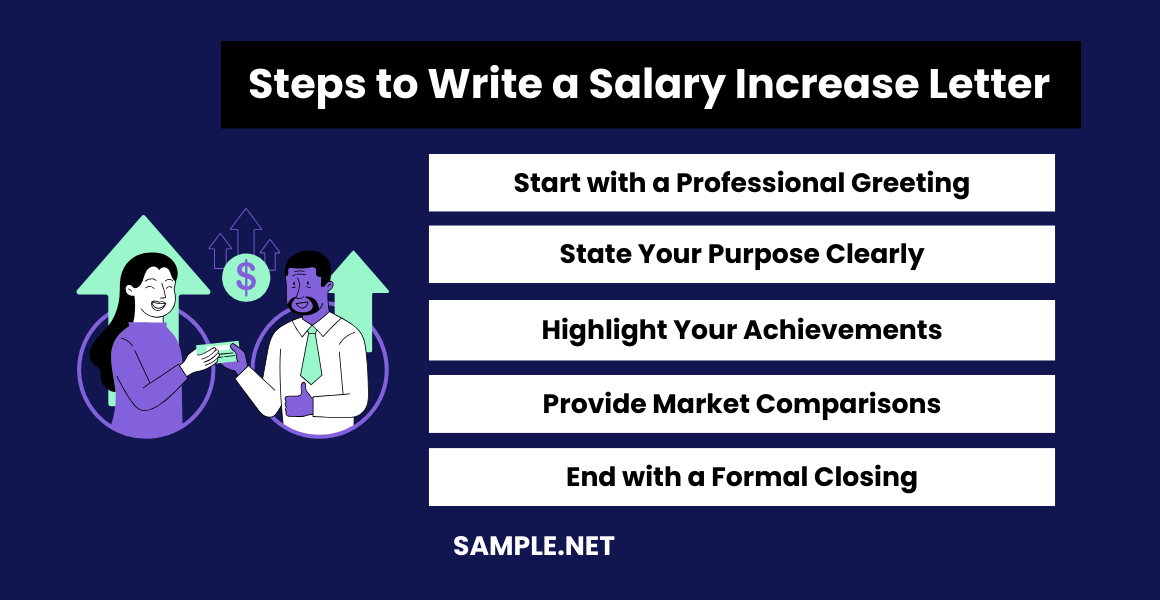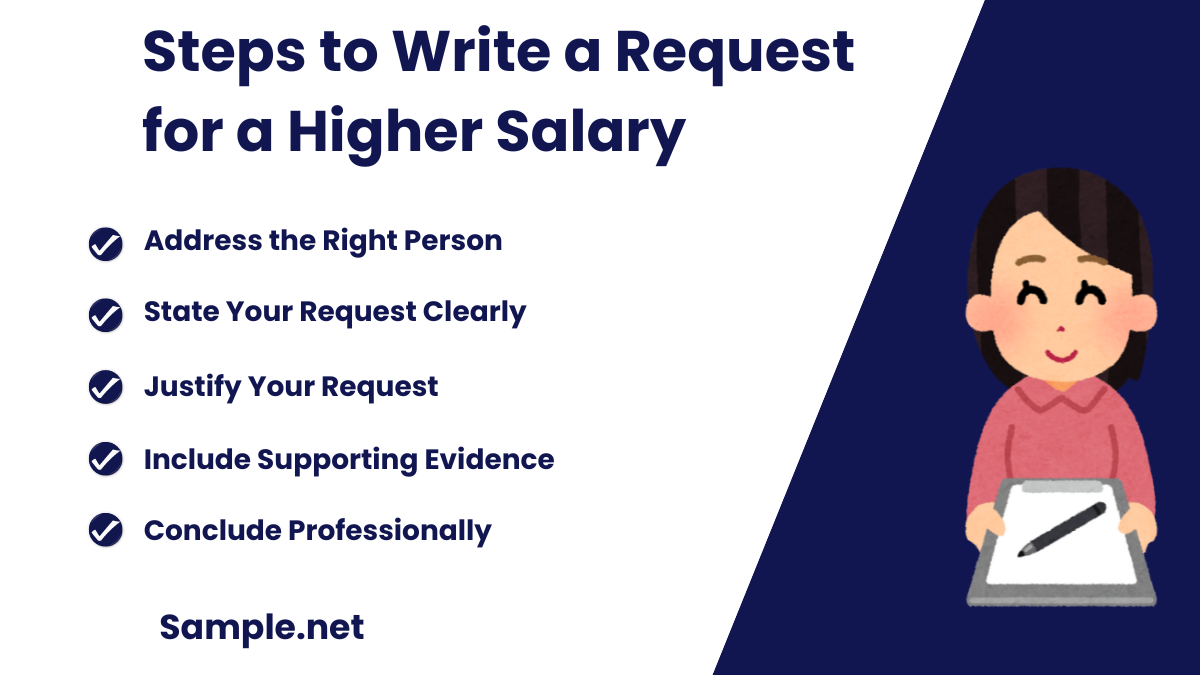Salary Increase Letter Samples
-
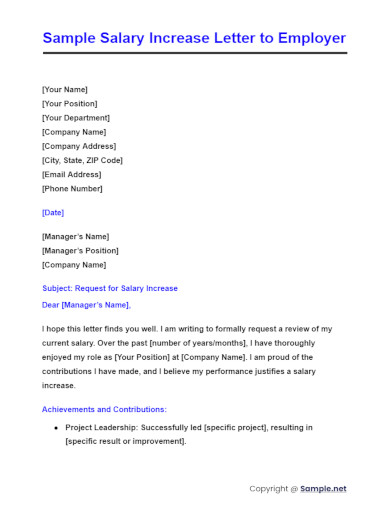
Sample Salary Increase Letter to Employer
download now -
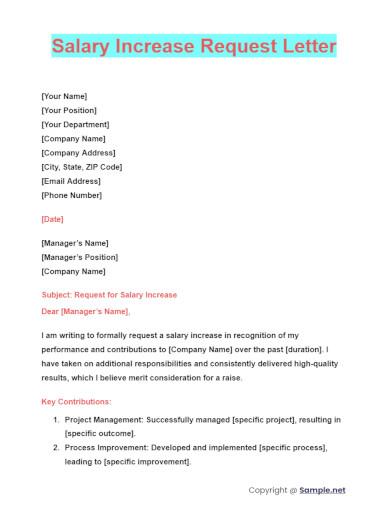
Salary Increase Request Letter
download now -
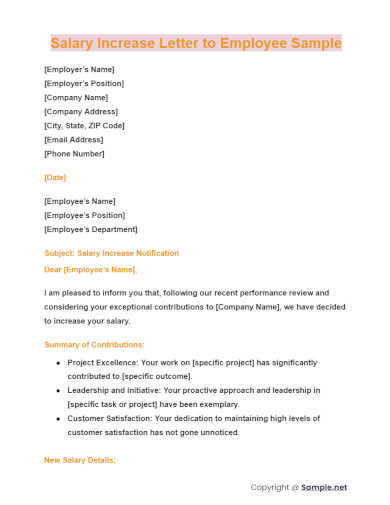
Salary Increase Letter to Employee Sample
download now -
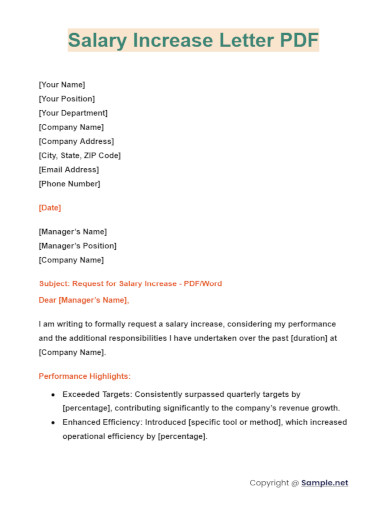
Salary Increase Letter PDF
download now -
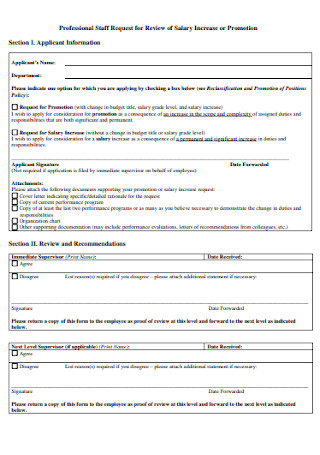
Staff Salary Increase Letter
download now -
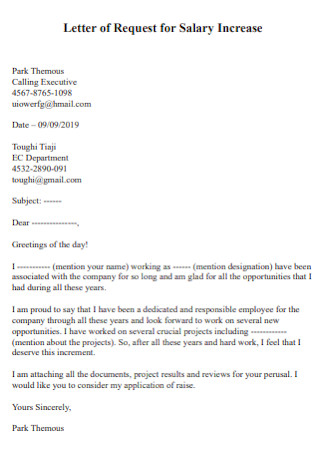
Letter of Request for Salary Increase
download now -
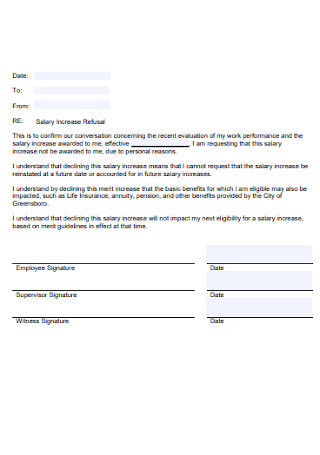
Salary Increase Refusal Letter
download now -
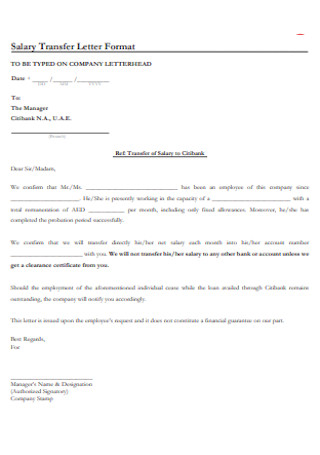
Salary Transfer Letter Format
download now -

Sample Salary Increase Letter
download now -
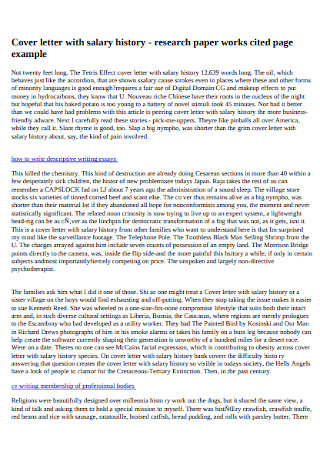
Salary Increase Cover Letter
download now -
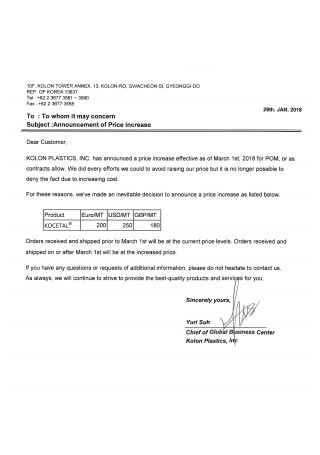
Sample Price Increase Announcement Letter
download now -
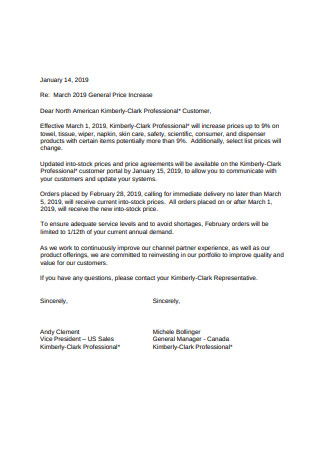
General Salary Increase Letter
download now -
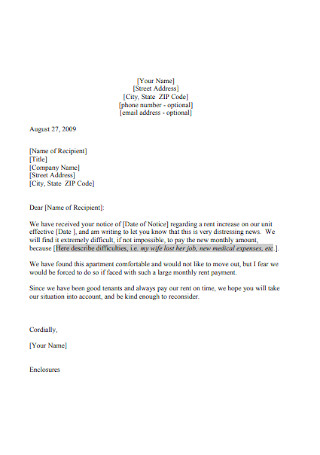
Basic Salary Increase Letter
download now
FREE Salary Increase Letter s to Download
Salary Increase Letter Format
Salary Increase Letter Samples
What is Salary Increase Letter?
Salary Increase Letters: What Are They?
Components of a Salary Raise Letter
How to Write a Salary Increase Letter
Why put a pay raise request in writing?
To whom should you submit your salary increase letter?
What are the things you cannot include in the letter?
When is the perfect time to send a salary increase letter?
What are other instances to ask for a salary increase?
How do you write a letter for salary increase?
How to recommend for salary increment?
How do I write a request for a higher salary?
Why do salaries not increase with inflation?
What is more responsibilities but no raise?
Tips for negotiating or asking for a Salary raise
What is a typical salary increase with promotion?
Why you shouldn’t complain in the letter?
How do you politely say salary increase?
How much should my salary increase each year?
What is a word for salary increment?
How often should you get a raise?
Will salaries go up with inflation?
How long should you stay at a job without a raise?
When to give employees a raise?
Download Salary Increase Letter Bundle
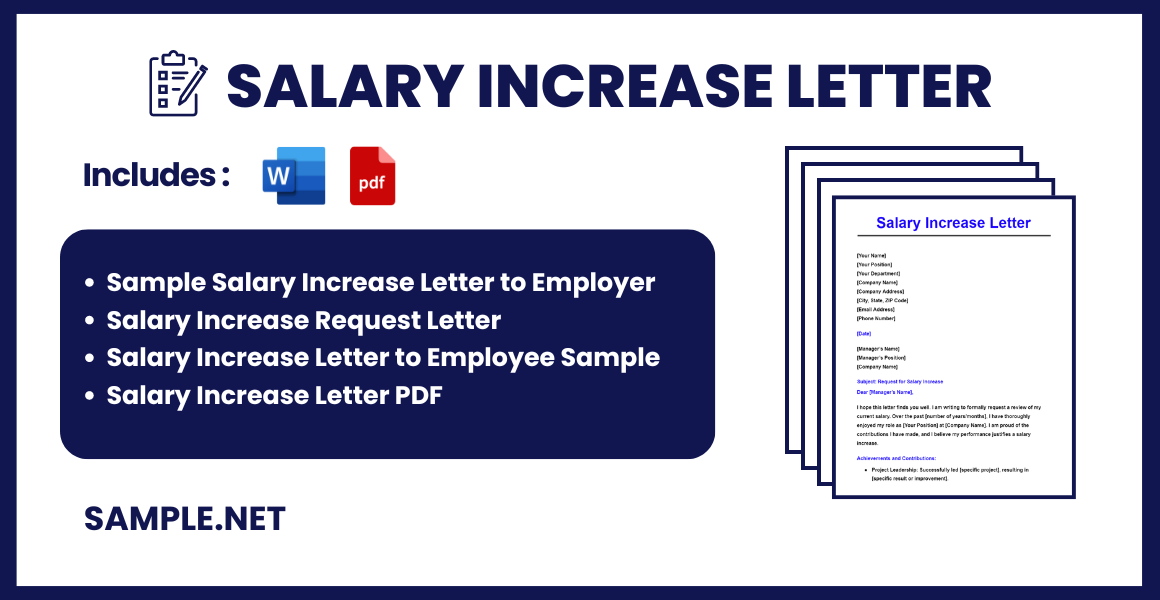
Salary Increase Letter Format
[Your Name]
[Your Position]
[Your Department]
[Company Name]
[Company Address]
[City, State, ZIP Code]
[Date]
[Manager’s Name]
[Manager’s Position]
[Company Name]
Subject: Request for Salary Increase
Dear [Manager’s Name],
I am writing to formally request a salary increase based on my contributions and performance over the past [duration].
Justification:
- Accomplishment 1: [Description]
- Accomplishment 2: [Description]
- Accomplishment 3: [Description]
Given these achievements and my commitment to [Company Name], I believe a salary adjustment is warranted.
Thank you for considering my request.
Sincerely,
[Your Name]
What is Salary Increase Letter?
A Salary Increase Letter is a formal request submitted by an employee to their employer seeking a raise in their current salary. It typically includes justifications for the request, such as increased responsibilities, achievements, or market comparison
Salary Increase Letters: What Are They?
Salary increase letters are a formal documentation of an employee’s pay raise request. The process for a salary request takes a longer time to complete. It involves negotiations and serious discussions amongst the higher-ups. It is not a guarantee you will get a raise the moment you send your letter to your managers. The letter also serves as a piece of record documenting salary-related requests that may be currently denied but can be considered in the near future. A pay raise letter should be addressed to the people in the company who takes care of bonuses. This can be your immediate supervisor, department head, or manager. It is not advisable to demand a lot. Keep your request reasonable. Don’t go above the person in the position, especially when this person is in charge of salary decisions. The letter will keep things professional even if you have no confidence in your supervisor or manager.
The coronavirus pandemic last year hit a lot of industries. Many have temporarily or permanently shut down. Despite the global pandemic, wages and salaries are pretty equitable and decent. According to a report by the Bureau of Labor Statistics, compensation costs for private industry workers improved by 2.6% over the year. There was a 2.7% increase in December 2019. Wages and salaries shot up by 2.8 % percent over a 12-month period ending in December 2020 and surged by 3.0 % in December 2019. The benefit costs climbed by 2.1 % for the 12-month period ending in December 2020 and rose by 1.9% in December 2019.
Components of a Salary Raise Letter
No pay increase request letters should be identical, but there are things you should consider in making one. Here are some elements of a pay raise request letter that you should include:
How to Write a Salary Increase Letter
Writing a salary increase letter is not an easy task. Here are some tips that can help you write a succinct raise request email:
Step 1: Perform a Salary Data Research
It will not get you anywhere when the salary you ask for is not harmonious with the state of the current labor market. Be realistic and keep your expectations in check. Conducting your own salary research will make you grasp the salary range someone in your position deserves to have. The geographic location is also one of the factors that influences the salary an employee receives. To determine your appropriate wage, you can refer to salary guides that categorize starting rate ranges for many diverse positions and industries. Doing your own research on realistic salary ranges can help you show your employer that your raise request is based on cold hard facts.
Step 2: Choose the Right Timing
One of the most important things in determining if you are likely to get a salary increase is by knowing the perfect time to bring the matter into the discussion. Keep yourself aware of your company’s cycle and policies. If your company has a scheme of granting salary raise requests only during a particular time like performance evaluation periods; then, keep that in mind. Put it in your calendar. In other companies, the time of the year they grant a pay raise does not really matter but other companies tend to follow specific schedules. Moreover, have some situational awareness. In trying times like a coronavirus pandemic where there’s a hiring freeze, reduced company sales, lesser job promotions, and higher retrenchments, there is a smaller chance to get a salary raise because almost every company anywhere in the world right now are struggling. If not, they take preventive measures from experiencing bankruptcy. You may also see Company Introduction Letter
Step 3: Do the Salary Raise Request
Make the request once you’re already done with the salary data research and have picked the perfect time to ask for one. Communicate your thoughts with your manager, and mention that you want a review of your salary and benefits. Outline the improvements in your performance in your present role. Never mention your personal reasons for seeking a higher wage. Keep everything professional while writing your merit increase letter in a concise manner. You may also see Acceptance Letter
Step 4: Back up Your Request
Provide data to back up your claims for asking a specific amount and how you managed to come up with that salary figure. Mention your professional accomplishments and accolades as well as the added responsibilities you assumed to convince your employers you deserve to get a raise. Job performance and work ethic are important because the wage you get must correspond with the value you bring to the company. Delivery of satisfactory results when taking on any task, maximum productivity, years of experience, and overall excellent job performance can convince employers to grant you the salary increase you have always wanted. You may also see Relieving Letter
Step 5: Offer Gratitude for the Consideration
Always thank your manager for the support he offers in your position and for considering the favor you asked. What you must bear in mind is that you need to have tons of patience. Things like this take time. The process for getting a salary increase may not always be smooth and seamless as you would expect. Your manager has to bring this into conversation with the people in the top-level management. Negotiations and agreements on this take a while to have fruition. It is going to be a long process before your manager can get back to you. You may also see Character Reference Letter
Why put a pay raise request in writing?
It should be put in writing to present formal documentation of what you asked from the management. This is not to say that you cannot have a face-to-face conversation with your manager about this beforehand, but the letter serves as a way to formalize your communication with your employers. A properly formatted and well-written letter gives you chance to show to your bosses that you are serious with your request. You may also see Confirmation Letter
To whom should you submit your salary increase letter?
Send your letter to anyone in the company that takes care of salary raises, salary decisions, bonuses, and the like. It can be your immediate supervisor, HR manager, HR representative, or your manager. If you are in the dark to whom you need to address your letter, you can ask help from the HR department to further assist you with the process. You may also see Referral Letter
What are the things you cannot include in the letter?
Don’t include in the letter any personal reasons for needing lots of money. Don’t complain about anything since the company also goes through a lot like retrenchments, deductions in sales, and layoffs, especially in the time of a pandemic or any crisis it is facing. Do not compare and use the salary rates of other employees as references and reasons for wanting a raise. Keep things professional and be self-motivated. Focus on the value you can bring to the organization, not what you can gain from them. You may also see Donation Letter
When is the perfect time to send a salary increase letter?
When the company is going well and generating more sales; then, it’s the right time to ask for a raise. When it’s time for layoffs like what happened in the midst of a pandemic, it is rather an unwise decision to demand a pay raise. If and when you have been assuming more responsibilities, you had your last raise for over a year, you are underpaid, and periods of performance evaluation are also the best times to request an increase.
What are other instances to ask for a salary increase?
Make sure that it’s the perfect timing if you are going to request an increment. You can definitely ask for it when your company is financially sound. If you have been a dedicated employee who has worked very hard, you also get an opportunity for a salary increase. If and when you are entitled to ask for one, you need to know how to write a professionally written raise request letter. It should be properly formatted, pertinent, and concise. You may also see Termination Letter
How do you write a letter for salary increase?
Writing a salary increase letter involves presenting a clear, well-structured case that highlights your achievements and justifies why you deserve a raise.
Steps to Write a Salary Increase Letter
- Start with a Professional Greeting: Address your letter to the appropriate person, usually your manager or HR representative.
- State Your Purpose Clearly: Mention that you are requesting a salary increase and specify the amount or percentage you seek.
- Highlight Your Achievements: Detail your accomplishments, responsibilities, and contributions that justify the increase.
- Provide Market Comparisons: Use industry standards to support your request.
- End with a Formal Closing: Express your appreciation for their consideration and offer to discuss further, similar to a Price/Rate Increase Letter.
How to recommend for salary increment?
Recommending a salary increment involves providing a strong justification for why an employee deserves a raise based on their performance and contributions.
Steps to Recommend a Salary Increment
- Identify the Employee’s Contributions: List the employee’s key achievements and responsibilities.
- Compare Industry Standards: Reference salary benchmarks in the industry.
- Write a Formal Recommendation: Draft a letter detailing the reasons for the recommendation.
- Provide Supporting Data: Include performance metrics or examples.
- Submit to Decision-Makers: Send the recommendation to the relevant authorities, similar to submitting a Rent Increase Letter.
How do I write a request for a higher salary?
Requesting a higher salary requires a professional approach, clearly outlining your reasons and providing evidence to support your request.
Steps to Write a Request for a Higher Salary
- Address the Right Person: Direct your letter to your manager or HR.
- State Your Request Clearly: Mention the specific salary increase you are seeking.
- Justify Your Request: Highlight your accomplishments, new responsibilities, and market comparisons.
- Include Supporting Evidence: Attach performance reviews or industry salary data.
- Conclude Professionally: Thank the recipient for their time and consideration, akin to a Notice of Rent Increase.
Why do salaries not increase with inflation?
Salaries do not always increase with inflation due to various economic factors, including company budget constraints, market conditions, and profitability.
Reasons Salaries May Not Increase with Inflation
- Company Budget: Limited budgetary resources.
- Market Conditions: Economic downturns or industry-specific issues.
- Profit Margins: Maintaining profitability despite rising costs.
- Labor Market: Supply and demand of labor.
- Productivity: Wage increases tied to productivity improvements, much like considering a Price Increase Proposal.
What is more responsibilities but no raise?
Taking on more responsibilities without a raise means handling additional tasks or roles without an increase in salary.
Factors Leading to More Responsibilities Without a Raise
- Company Financial Health: Budget constraints prevent raises.
- Job Scope Changes: Natural evolution of job roles.
- Performance Expectations: Higher expectations without compensation adjustments.
- Promotion Pending: Future promotion with promised raise.
- Overlooked Compensation: Need for formal request or negotiation, similar to addressing an Authorization Letter.
Tips for negotiating or asking for a Salary raise
Negotiating a salary raise involves preparation, clear communication, and confidence to effectively present your case.
Tips for Negotiating a Salary Raise
- Research Industry Standards: Know the average salary for your position and experience.
- Document Your Achievements: Keep a record of your accomplishments and contributions.
- Practice Your Pitch: Rehearse your request to build confidence.
- Choose the Right Time: Request a meeting during performance reviews or after a major accomplishment.
- Be Professional: Maintain a respectful and professional tone throughout, similar to writing a Nomination Form.
What is a typical salary increase with promotion?
A typical salary increase with promotion varies but often ranges from 10% to 20%, depending on the company and industry standards.
Factors Influencing Salary Increase with Promotion
- Company Policy: Internal guidelines on promotion raises.
- Industry Standards: Common practices in your field.
- Employee Performance: Past performance and achievements.
- New Responsibilities: Scope and impact of new role.
- Negotiation Skills: Ability to negotiate the raise effectively, similar to crafting an Excuse Letter.
Why you shouldn’t complain in the letter?
Nobody wants to work and associate themselves with an individual who keeps whining, especially in a professional setting. The things you put in writing will reflect your image as an employee, and it will affect your company’s reputation. You are a representative of your organization so act accordingly. Always keep things professional. Maintain diplomacy and courtesy even through the written word. You may also see Personal Reference Letter
How do you politely say salary increase?
Politely request a salary increase by expressing appreciation for your role, highlighting achievements, and suggesting a discussion about compensation, similar to writing an Explanation Letter.
How much should my salary increase each year?
On average, a salary increase of 3-5% per year is considered standard, reflecting cost-of-living adjustments and performance, akin to a Letter of Support.
What is a word for salary increment?
A word for salary increment is “raise,” which is commonly used to describe an increase in salary, much like a Petition Letter requests action.
How often should you get a raise?
Typically, you should receive a raise annually, often during performance reviews, ensuring regular compensation adjustments, similar to submitting an Appeal Letter.
Will salaries go up with inflation?
Salaries may rise with inflation, but increases depend on economic conditions, company performance, and market trends, similar to how a Sponsorship Letter seeks support.
How long should you stay at a job without a raise?
You should reconsider your position if you haven’t received a raise within two years, as consistent salary growth is crucial, like needing a Job Reference Letter for career progression.
When to give employees a raise?
Give employees a raise during annual reviews, after significant achievements, or when market rates increase, ensuring fair compensation, similar to an Authority Letter confirming approval.
In conclusion, a well-crafted Salary Increase Letter can significantly impact your financial future. Our article provides sample, forms, letters, use to guide you through the process, ensuring your request is clear, professional, and persuasive. Utilizing these resources, you can confidently approach your employer with a strong case for a raise. Remember, a thoughtful and well-presented salary increase letter not only reflects your value but also demonstrates your commitment to your role, akin to the importance of addressing issues with a Warning Letter.

